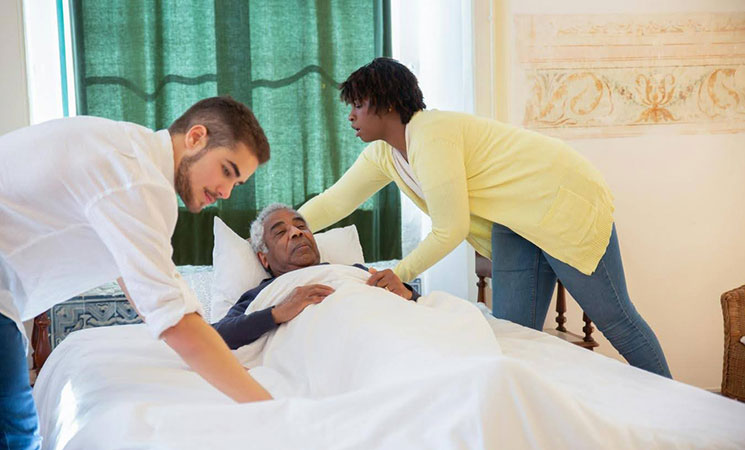Anxiety is a common issue among senior adults, often exacerbated by health concerns, isolation, and changes in their living environment. Addressing anxiety is crucial for improving their overall well-being. Nurses play a vital role in helping seniors manage and relieve anxiety through personalized care and effective strategies. This article explores various ways nurses can support senior adults in alleviating anxiety.
1. Understand the Causes of Anxiety in Seniors
To effectively help seniors manage anxiety, nurses must first understand its causes. Common causes of anxiety in elderly patients include health problems, loss of loved ones, and decreased independence. Identifying specific triggers for each patient is essential. For example, some seniors may feel anxious due to chronic pain or mobility issues, while others might be affected by social isolation or financial concerns. Nurses should conduct thorough assessments to pinpoint these triggers and develop personalized care plans that address the root causes of anxiety. Engaging in creative activities can significantly relieve anxiety in older adults, which is one of the key reasons why understanding how arts and crafts benefit senior living is so important for fostering emotional well-being in senior communities.
2. Build Trust and Rapport
Seniors are more likely to share their concerns and respond positively to interventions when they feel understood and respected. Nurses can build trust by engaging in active listening, showing empathy, and maintaining open communication. Simple actions like making eye contact, using a calm and reassuring tone, and spending extra time with patients can make a significant difference.
3. Educate About Anxiety Management Techniques
Educating seniors about anxiety management techniques is a crucial step in helping them alleviate anxiety. Nurses can teach methods such as deep breathing exercises, meditation, and progressive muscle relaxation to help seniors manage their stress levels. Providing information on the benefits of regular physical activity and maintaining a healthy diet also supports mental well-being. Obtaining advanced nursing education is essential for nurses to stay updated on the latest anxiety management strategies. By pursuing further education, nurses can equip themselves with the skills needed to offer comprehensive support to senior adults, enhancing their quality of life and reducing anxiety effectively.
4. Promoting Physical Activity
Exercise is known to reduce anxiety by releasing endorphins and improving overall health. Nurses can encourage and facilitate safe physical activities, such as walking, stretching, or light aerobics, tailored to the individual’s capabilities. Even gentle movements can have a positive impact on mental well-being. Regular physical activity can also help improve sleep patterns, which are often disrupted by anxiety.
5. Encouraging Social Interaction
Isolation can significantly contribute to anxiety in seniors. Nurses can encourage social interaction by organizing group activities, supporting participation in community events, or facilitating virtual meetups with family and friends. These interactions can provide emotional support and a sense of belonging. Social engagement can also help seniors stay mentally active and connected, reducing feelings of loneliness.
6. Ensuring Proper Nutrition
A balanced diet is crucial for mental health. Nurses can guide nutritious food choices and ensure seniors are getting the necessary vitamins and minerals. Sometimes, anxiety can be exacerbated by poor nutrition or dehydration, so maintaining a healthy diet can have a significant impact. Nurses can also monitor for signs of malnutrition and coordinate with dietitians to create individualized meal plans.
7. Monitor Medication and Treatments
Proper medication management is essential for seniors dealing with anxiety. Many elderly patients are on multiple medications, which can sometimes cause interactions or side effects that contribute to anxiety. Nurses play a key role in monitoring these medications, ensuring they are taken correctly, and recognizing any adverse effects. Regular medication reviews with healthcare providers are crucial to adjusting dosages or changing prescriptions as needed. Educating seniors about their medications, including what each one does and how it should be taken, can also reduce anxiety related to their treatment regimen.
8. Offer Cognitive Behavioral Strategies
Cognitive Behavioral Therapy (CBT) techniques are effective in managing anxiety. Nurses can introduce seniors to simple CBT exercises that help them identify and challenge negative thought patterns. Techniques such as journaling, where patients write down their thoughts and feelings, can help them understand and manage their anxiety better. Nurses can also teach seniors how to break down overwhelming tasks into smaller, more manageable steps, reducing feelings of anxiety and improving their ability to cope with stress. Providing resources and support for practicing these strategies can empower seniors to take control of their mental health.
9. Encouraging Hobbies and Interests
Engaging in hobbies and interests can provide a distraction from anxiety and a sense of purpose. Nurses can help seniors identify activities they enjoy, whether it’s reading, gardening, crafting, or playing an instrument, and find ways to incorporate these activities into their daily routine. Hobbies can also offer a sense of accomplishment and joy, contributing to overall emotional health.
10. Facilitating Access to Professional Help
When anxiety is severe, professional help from psychologists or psychiatrists may be necessary. Nurses can assist in scheduling appointments, providing transportation, or simply offering encouragement to seek help. They can also follow up to ensure that the seniors are adhering to their treatment plans. Close collaboration with mental health professionals ensures that seniors receive comprehensive care.
11. Create a Calming Environment
Creating a calming environment is crucial in helping seniors manage anxiety. A peaceful living space can significantly reduce stress levels and promote a sense of security. Nurses can help by ensuring that the senior’s environment is clean, organized, and free from clutter. Soft lighting, calming colors, and the use of familiar and comforting items can also make a difference. Additionally, incorporating elements such as aromatherapy with lavender or chamomile and playing soft, soothing music can create a serene atmosphere that helps alleviate anxiety.
12. Promoting a Consistent Daily Routine to Foster Stability
A predictable daily routine can provide a sense of stability and reduce anxiety. Nurses can help seniors establish and maintain a consistent schedule for meals, medication, activities, and rest. This consistency can help reduce feelings of uncertainty and anxiety by creating a structured and reliable environment. Ensuring that daily activities are predictable helps seniors feel more secure and less anxious about the unknown.
Conclusion
Nurses play a critical role in helping senior adults manage and relieve anxiety. By creating a calming environment, monitoring medication, providing nutritional guidance, offering cognitive behavioral strategies, and supporting family members and caregivers, nurses can significantly improve the quality of life for elderly patients. Continuous learning and professional development are essential for nurses to stay informed about the best practices in anxiety management. Implementing these strategies ensures that seniors receive compassionate and comprehensive care, leading to better mental health and overall well-being.














